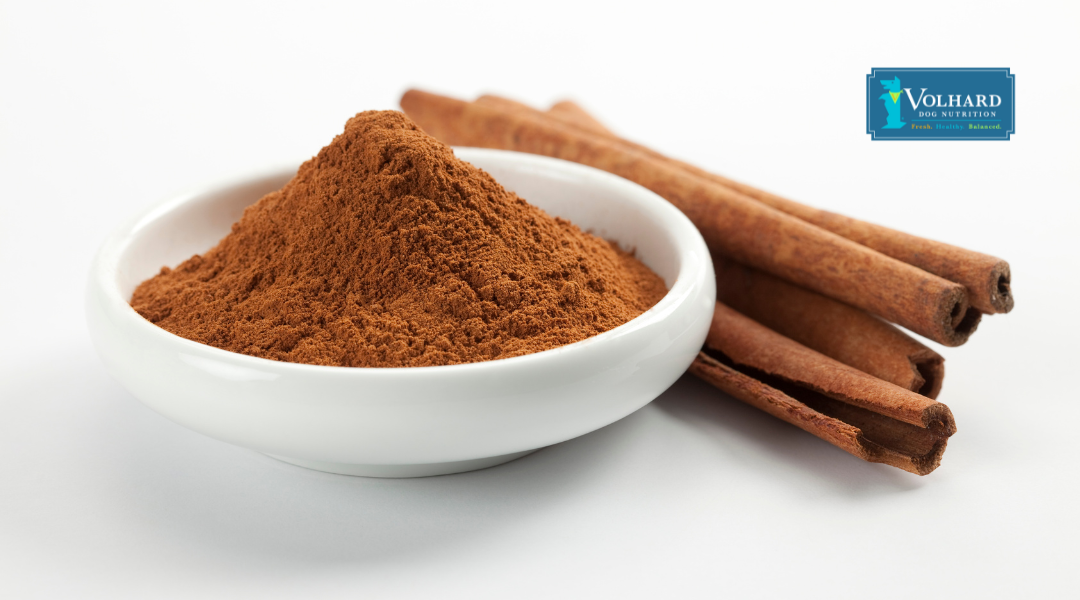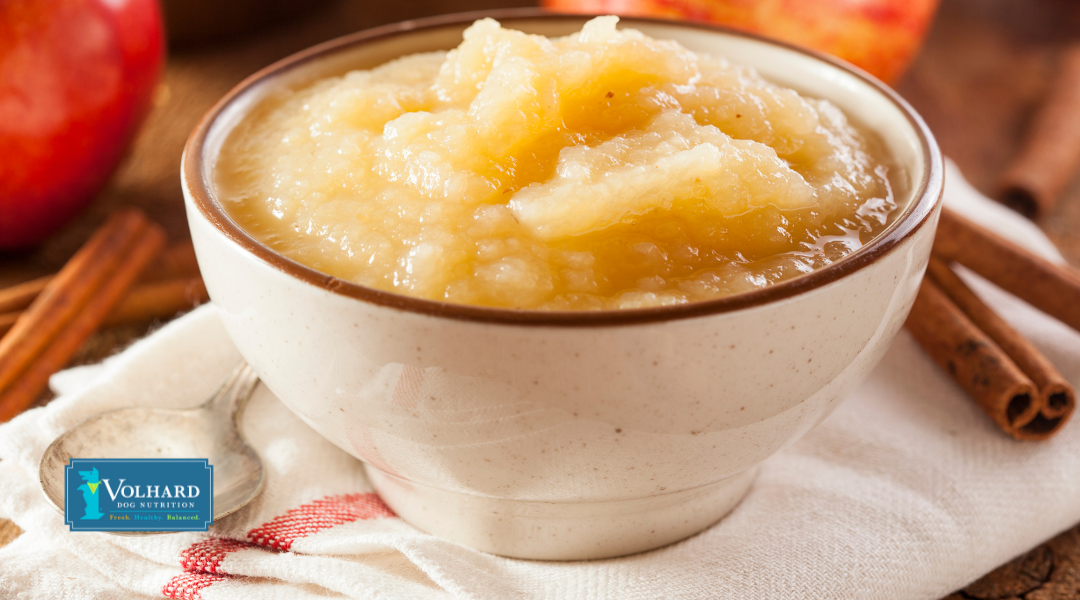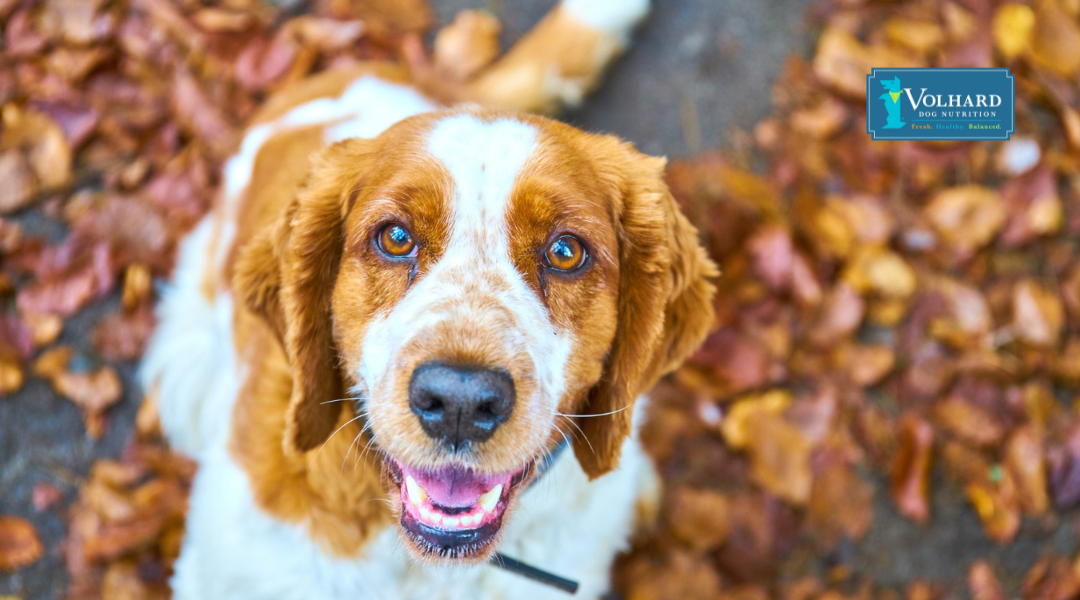Is Cinnamon Good for Dogs?
Posted by Volhard Dog Nutrition on Nov 28th 2022
The jolly holiday season is right upon us! The smell of old-time favorites like snickerdoodles, cinnamon buns, and cinnamon-baked pumpkin pervades our homes, not to mention the classic pumpkin spice flavor in our morning lattes!
No wonder our dogs want to be a part of the holiday action! But before we let our dogs indulge in this culinary extravaganza, let's find out if our furry friends do well with the king of holiday spices: cinnamon!

Is Cinnamon Good for Dogs? Yes!
Cinnamon is one of the most widely used spices in the United States, second only to black pepper. Harvested from the bark of trees in the Cinnamomum family, it grows in the warm regions of the Americas and Southeast Asia.
For thousands of years, people have valued cinnamon not only for its flavor but also for its medicinal qualities. Rich in antioxidants and known for its anti-inflammatory properties, cinnamon has been linked to benefits such as supporting healthy blood glucose levels.
The good news? Dogs can enjoy some of these same benefits. A light sprinkle of cinnamon can be a safe and tasty addition to your dog’s diet. The key is moderation: too much cinnamon can upset your dog’s stomach, and inhaling the powder may cause coughing or irritation.
Let’s clear up the biggest question right away, cinnamon is not toxic to dogs, when used sparingly, it can add variety to their meals and even support their overall wellness. Too much cinnamon will cause symptoms of toxicity, both in humans and dogs. Not all cinnamon is the same. Different types of cinnamon come with unique advantages and drawbacks, so let’s explore which variety may be best for your dog.
Ceylon Cinnamon is the Healthiest Option for Your Dog
If you want to share cinnamon with your pup, look for Ceylon cinnamon. This variety is sweeter, lighter in color, and far healthier for dogs because it contains significantly lower levels of coumarin, a natural compound that can be harmful in large amounts. The only downside? Ceylon cinnamon is more expensive and not as easy to find compared to its darker counterpart.
It's Best to Avoid Cassia Cinnamon
The type of cinnamon most people recognize is Cassia cinnamon. Dark brown in color and harvested from the Cinnamomum cassia tree in China and Indonesia, it’s widely available and inexpensive thanks to its easy cultivation. However, affordability comes with a tradeoff: Cassia contains much higher levels of coumarin, which has been linked to kidney and liver issues in humans. For dogs, that risk means Cassia should only be given in very small amounts, or avoided altogether if Ceylon is available.

7 Health Benefits of Cinnamon for Dogs
Cinnamon offers a variety of wellness benefits when added to your dog’s diet in moderation:
- Supports Joint Health
Helps dogs with arthritis or joint pain by aiding in weight management and reducing strain on their joints. - Reduces Inflammation
Acts as a natural anti-inflammatory, alleviating swelling and speeding up recovery from injuries. - Regulates Blood Sugar
Assists in managing blood glucose levels, making it beneficial for dogs with diabetes. - Promotes Heart Health
Research suggests cinnamon supplementation can improve heart function and lower systolic blood pressure. - Fights Harmful Microorganisms
Inhibits the spread of bacteria, viruses, and fungi, including Listeria, Salmonella, and E. coli. - Aids Digestion
Its polyphenols, powerful antioxidant compounds, help relieve digestive discomfort and support a healthy gut. - Preserves Food Naturally
Prolongs the shelf life of food before refrigeration, making it a natural preservative.
How Much Cinnamon Powder Can a Dog Have?
Canine consumption calls for moderation, so start with a small dosage and refrain from feeding cinnamon to your dog on a daily basis. Diabetic dogs, who consume cinnamon to balance their blood sugar levels, are the exception to the rule.
The following dosages for ground cinnamon will help you gauge the appropriate amount of cinnamon for your dog:
- 10-pound dogs: a pinch to 1/8 of a teaspoon.
- 10 to 20-pound dogs: 1/8 to 1/4 of a teaspoon.
- 20 to 50-pound dogs: 1/4 to 1 teaspoon.
- 50 to 100-pound dogs: 1 to 2 teaspoons.
- Dogs over 100 pounds: 2 teaspoons to 1 tablespoon.
A Few Precautions to Observe When Feeding Cinnamon to Your Dog
#1: Your Dog Must Not Inhale Powdered Cinnamon
Powdered cinnamon is only healthy for dogs when ingested, not inhaled. When a dog inhales cinnamon powder, their body will respond with symptoms such as:
- Irritation.
- Coughing.
- Choking.
- Difficulty breathing.
Instead, mix the cinnamon with honey and feed it as a delicious snack. Avoid feeding cinnamon to pregnant dogs as it can have a very stimulating effect on the uterus.
#2: Steer Clear of Cinnamon Sticks and Essential Oils
Although more practical, cinnamon sticks and essential oils can upset a dog's oral cavity by causing mouth irritation.
#3: Be Careful Not To Feed Too Much Cinnamon
Although not fatal, cinnamon can be toxic for dogs when fed a pinch too much. A trip to the vet will help mitigate the symptoms of cinnamon toxicity and put your heart at ease.
#4: Absolutely No Cinnamon Toast Crunch!
The breakfast of champions is the way many of us start our day, and our dogs will sit right behind our chairs, hoping to catch any crunchy, sugary treat. But feeding classics such as Cinnamon Toast Crunch to our dogs is not a healthy idea. Aside from causing digestive issues like stomach upsets and diarrhea, Cinnamon Toast Crunch is devoid of any nutritional value — a risky price to pay with no reward.
#5: Don't Confuse Cinnamon With Nutmeg!
With such a variety of spices at our disposal, there's no surprise that we sometimes get them all mixed up. But a low-stakes mistake can turn into an unfortunate accident. That is the case with nutmeg.
Nutmeg contains a toxin called myristicin, a naturally-occurring insecticide found in various herbs and spices. Disorientation, hallucinations, abdominal pain, and increased blood pressure make up the most common symptoms of myristicin poisoning.
Although toxic to dogs, only large quantities of nutmeg (e.g., 1 to 3 tablespoons) cause dangerous symptoms — small amounts, such as the ones found in baked goods, will only upset your dog's tummy. Do not hesitate to see a veterinarian if your dog has consumed the wrong spice, even in tiny amounts.

Time for Some Yummy Baked Treats for Your Dog!
Are you unsure how to supplement your dog's diet with cinnamon? Our unique recipes will help you whip up a healthy, nutritious cinnamon snack for your furry friend in no time!
Pumpkin Treats (Breakfast Bars) From Volhard Dog Nutrition!
Ingredients:
- 4 cups of oats.
- 1 cup of millet (or barley).
- 1 cup of whole wheat flour.
- 4 eggs with shells.
- 1/2 cup of safflower oil.
- 1/2 cup of molasses.
- 2 tablespoons of local raw honey.
- 1 tablespoon of cinnamon.
- 1 cup of pumpkin.
- 1/4 cup of boiling water.
How to prepare:
- Choose your pan size.
- Spray with non-stick cooking spray. For the smaller size, 1 tablespoon fits perfectly. For the larger size, 1/4 cup fits perfectly.
- Bake at 350 F for approximately 10-15 minutes (cupcake pans) or 45-60 minutes (9x13 pans). If your dog likes them crispier, you can turn off the oven and leave them in for an additional 10-30 minutes.
Yummy Cinnamon Oat Cookies!
Ingredients:
- 2 cups of oat flour.
- ½ cup of plain applesauce.
- 1 teaspoon of cinnamon.
- 1 pasture-raised egg.
- 1 teaspoon of honey.
- ½ tablespoon of coconut oil.
How to prepare:
- Preheat the oven to 350 F.
- Mix the flour, applesauce, and cinnamon.
- Add in the egg once the ingredients are well mixed.
- Add the honey and coconut oil to the dough.
- Let the dough chill for 15 minutes. Roll out the dough to the desired thickness and use cookie cutters to create your preferred cookie shapes.
- Line the baking sheet with coconut oil.
- Place the dough on the baking pan and bake for 10 (soft texture) to 20 minutes (crunchy cookies).
- Allow the cookies to cool down, and serve them to your dog. The cookies can be stored in the fridge for future use.
Halloween Peanut Butter and Pumpkin Biscuits!
Ingredients:
- 2 1/2 cups of whole-wheat flour.
- 3/4 teaspoon of ground cinnamon.
- 1/2 teaspoon of salt.
- 1/2 cup of pumpkin puree.
- 2 tablespoons of all-natural peanut butter.
- 2 large, beaten eggs.
How to prepare:
- Preheat the oven to 350 F.
- Mix the first three ingredients. Whisk in the pumpkin and the peanut butter.
- Beat in the eggs until you're left with a smooth dough.
- Roll the dough to a 1/2-inch thickness and use cookie cutters to create your preferred cookie shapes.
- Bake the cookies for 35-40 minutes. Allow them to cool down, then feed them to your dog.
Frequently Asked Questions
Q: Can dogs have applesauce with cinnamon?
In moderation, yes, applesauce with a small amount of cinnamon can be okay for dogs. The article notes that cinnamon itself is not toxic to dogs when given in appropriate amounts.
Just be sure the applesauce doesn’t contain harmful additives (like xylitol, excessive sugar, or artificial sweeteners), and use Ceylon cinnamon if possible, because it has lower coumarin levels than Cassia.
Q: Is cinnamon oil safe for dogs?
No, cinnamon essential oil is not safe for dogs. Cinnamon sticks and essential oils can irritate your dog’s mouth and other parts of the body.
Q: Can dogs eat cinnamon oatmeal?
Generally yes, dogs can eat oatmeal with cinnamon, provided that it’s prepared in a dog-safe way. A little ground cinnamon is okay, but again in moderation. don’t use too much cinnamon, especially of the Cassia variety, which has more coumarin.
Volhard Helps Pet Parents Build Informed Diets!
For more advice on dog nutrition, health, and training, contact us and check out our other blogs, too!
Volhard Dog Nutrition and its expert canine nutrition coaches offer online consultations to help more dog parents discover why and how to feed their dogs the healthiest foods!
Speaking to a Volhard canine nutrition coach will help you understand the inseparable relationship between healthy food, a healthy body, and a healthy mind.
If you want to contact one of our Volhard canine nutrition coaches, you can do so by utilizing our Live Chat feature or scheduling a consultation.
References:
"Cinnamon: Health Benefits, Uses, Nutrition, and Side Effects." WebMD, www.webmd.com/diet/supplement-guide-cinnamon.
"Can Dogs Have Cinnamon? And What About Cinnamon Rolls?" Pumpkin Pet Insurance, 10 Feb. 2025, www.pumpkin.care/post/can-dogs-eat-cinnamon.
"What Are Polyphenols and Why Are They Good for You?" Healthline, www.healthline.com/nutrition/polyphenols.
"Can Dogs Eat Cinnamon?" American Kennel Club, www.akc.org/expert-advice/nutrition/can-dogs-eat-cinnamon/.



